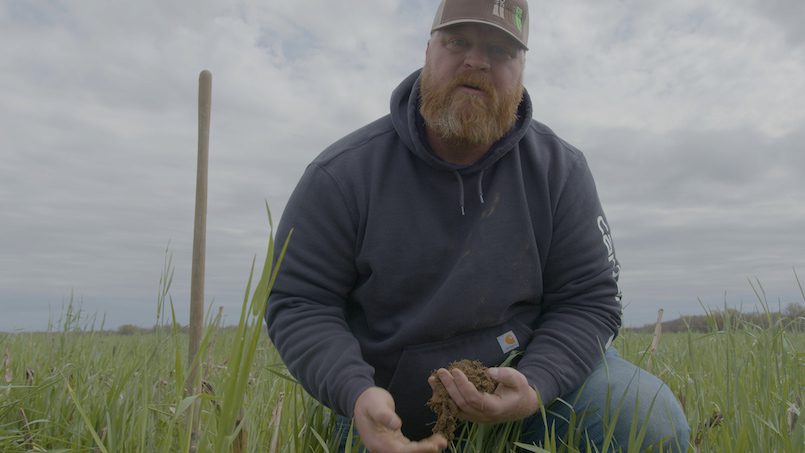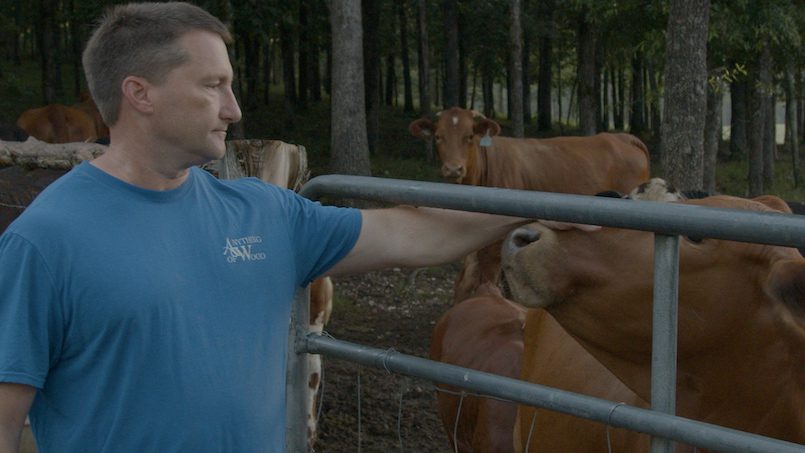15 Aug 2022 Free screening of PBS documentary ‘Dirt’ set for Aug. 18
CONWAY — Arkansas PBS breaks through the surface to explore the living, breathing ecosystem beneath it in “Dirt,” a new documentary about the importance of soil conservation, premiering Thursday Sept. 1, at 7 p.m., and livestreaming at myarpbs.org/watch.
As world population and food production demands rise, this film delves into how Arkansas farmers, ranchers and others are conserving their soil, water, air and other natural resources, improving their operations and helping the environment with sustainability methods from the United States Department of Agriculture’s Natural Resources Conservation Service (NRCS). NRCS conservationists provide technical expertise and conservation planning for farmers, ranchers and forest landowners wanting to make conservation improvements to their land.

A free, advance screening of “Dirt” will be held Thursday, Aug. 18, at 7 p.m. at the Central Arkansas Library System’s Ron Robinson Theater, 100 River Market Ave., Little Rock. Doors open at 6 p.m., and attendees will have the opportunity to speak with Lacey Thacker and Sara Mitchell, authors of “Conservation in Arkansas Agriculture.” Copies of the book will be given away during the event.
Featured in the film are:
- Margie Raimondo, a Sicilian-American originally from Los Angeles, who owns and operates Urbana Farmstead inside the city limits of Little Rock. She raises chickens and grows vegetables, fruits, and herbs on just over one acre of land. Utilizing high tunnel grow houses, cover crops, crop rotation and micro-irrigation, she can produce many of her crops year-round.
- Raymond Kelley, who spent almost 25 years working for the Safeway and Harvest Foods grocery company and now operates a wholesale produce business as his primary source of income. But, he still runs his cow/calf operation on the side, using managed grazing and making sure the grass recovers before the next grazing rotation to maintain soil health.
- Richard White, who raises cattle near Royal. He didn’t originally intend to be a rancher – he owns a custom cabinetry shop and is also opening a gym. About 3 years ago, White put a few cows on some of his land as an experiment, and now the ranch is official. He uses fenced paddocks and controlled water systems for rotational grazing, installed heavy use areas to control compaction and erosion, and uses biomass plantings to improve his forage.
- Dallas Peebles, a life-long farmer working over 600 acres of land he grew up on near Augusta in Woodruff County. Dallas and his wife Katie produce organic specialty crop vegetables and honey from their on-site hives. They utilize irrigation management, multi-species cover crops, crop rotation, and reduced tillage among other sustainable practices and even maintain 14 acres of pollinator habitat.
- Adam Chappell, who owns and operates an 8,000-acre row crop farm with his brother Seth outside Cotton Plant in East Arkansas. The farm may have been in the family for four generations but the Chappells don’t shy away from innovation to keep their operation sustainable. Utilizing cover crops, animal integration, furrow irrigation and no-till methods have significantly improved the soil health on the farm in the last several years. Adam was a co-founder of the Arkansas Soil Health Alliance and has become a nationally-recognized speaker.
- Patti and Donnie Larimer, who aren’t full-time ranchers. Patti owns and operates a childcare center, and Donnie works full-time with the Arkansas Army National Guard. But, that doesn’t mean they aren’t passionate about their goats. They use rotational grazing, controlled water systems and heavy use areas on their small ruminant ranch in Greenwood. Their managed grazing practices contribute greatly to the health of their animals – a herd of almost 200 goats.
- Phillip J. (P.J.) Haynie III, a fifth-generation row crop farmer whose family owns and operates large farms in several states across the country. He has been farming in Arkansas since 2017. With a degree in agriculture and applied economics, Haynie knows that sustainable practices not only conserve natural resources, but also make good financial sense. He is a nationally recognized advocate for Black equity in agriculture serving as Chairman of the National Black Growers Council and has received the honor of being named a White House Champion of Change.
“‘Helping People Help the Land’ is what we’ve been doing at the USDA’s Natural Resources Conservation Service since 1935,” Arkansas NRCS State Conservationist Mike Sullivan said. “These success stories shine the spotlight on producers from across Arkansas who explain why they have implemented conservation practices and how they work on their land. These producers share their own conservation stories, and how practices are helping them protect and improve resources, how they save time and save money.

“It all begins with a conservation plan that NRCS offers at no cost. The plan is developed through the Conservation Technical Assistance Program to provide a blueprint to help producers achieve their objectives with personalized advice and information based on the latest science and research and to help them make informed decisions.”
More information about the film is available at myarpbs.org/dirt.
Major funding for “Dirt” is provided by the Pulaski County Conservation District and the United States Department of Agriculture’s Natural Resources Conservation Service in Arkansas.











